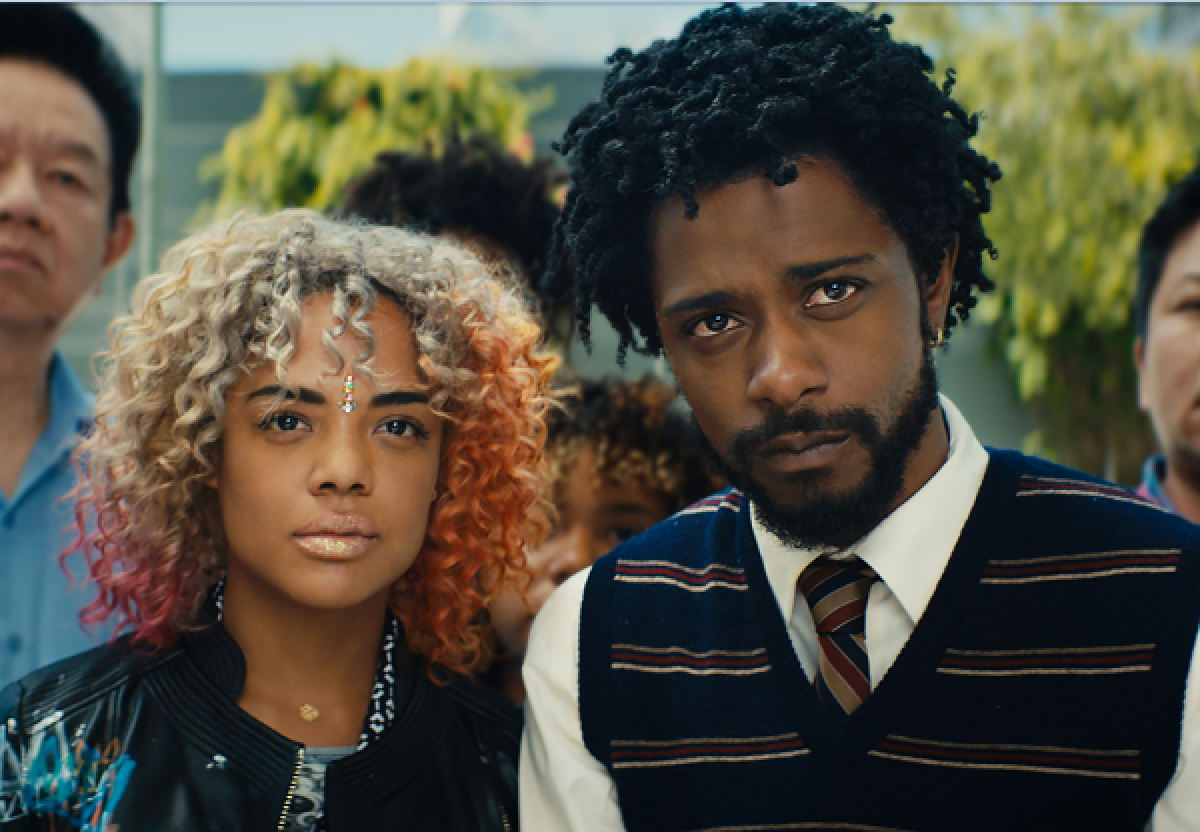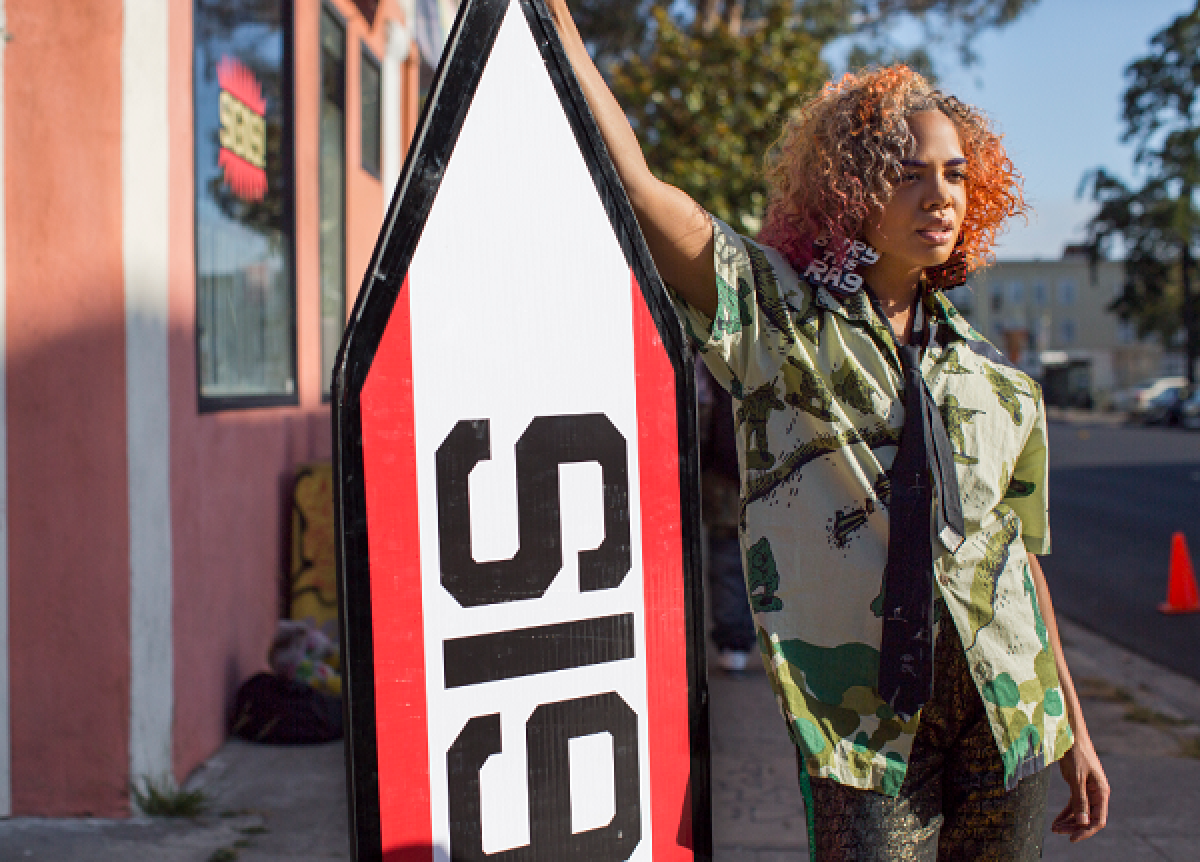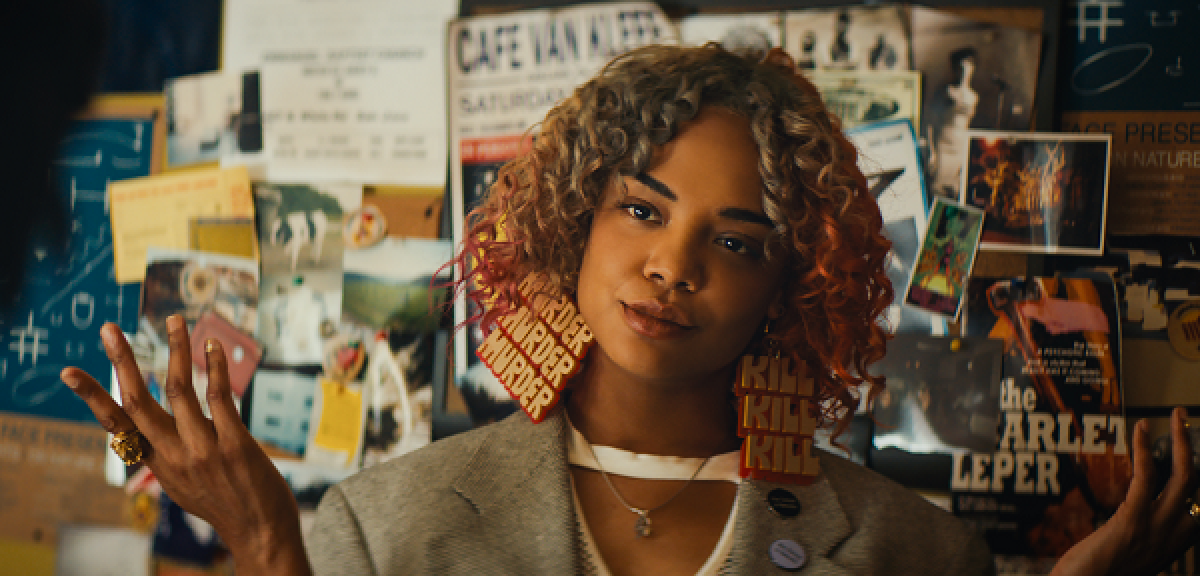In his directorial debut, Boots Riley's summer flick Sorry to Bother You is already being considered one of the year's best comedies, if not one of the most culturally relevant films of 2018.
Through the movie's unapologetically snippy humor and timely social commentary, viewers are led down a rabbit hole of dystopian satire as Cassius Green (Lakeith Stanfield) contemplates the role his rising telemarketing success plays in the advancement of Worry Free, a company founded by Steve Lift (Armie Hammer) that essentially operates under contractual slavery.
Whereas Cassius isn't sure if he should stand on the side of social justice, his free-spirited, sign-twirling and radical artist girlfriend Detroit, played by Tessa Thompson, is obviously on the side of the people. That's where viewers will find her for much of the movie: out on the frontlines for the people, with the people, and using her own artistic ventures to express society's alarming disregard for human beings.
With a background in cultural anthropology, tapping into Detroit's humanitarian ethos wasn't nearly as challenging for Thompson as pulling off the character's socially inclined performance art. In an interview with Newsweek, Thompson said Detroit's attempt to "figure out the intersection of the art she makes and activism" was something that really resonated with her, mostly because of her own history of using her platform to advocate for social justice. But that doesn't mean exercising it all for Sorry to Bother You didn't scare her a little bit.
Check out Newsweek's interview with Thompson below.
This interview has been condensed for purposes of length.

What drew you to the role of Detroit?
Everything. She is just trying to figure out the intersection of the art that she makes and activism and that's something that really resonates with me. And because she is this really fly performance artist, visual artist, Boots really just wanted to push the parameters of what you've seen on film in terms of the look and the aesthetic. So from jump, it was like sitting in a chair for nine hours, stripping my hair, making it this wild color, which was so different. I really love the idea of shape-shifting as much as I can and it's really rare to get to find parts where you get to do that. I loved that part of it. And then she uses every inch of herself as a canvas. That presented such a cool challenge in terms of finding her aesthetic.
I really wanted to work with Lakeith. I thought the screenplay was so brilliant and Boots was so special and so singular. And I've always wanted to make a film that hung out in this space of magical realism. So many of the films that I love—that I grew up watching over and over again as I really decided that I wanted to work in film—used magical realism, but they don't have black and brown faces in them. [We] just seem to be excluded from those narratives, and for that reason, I just always assumed I would never get to make a film like that. And so when this came along I was just like, "Finally."
One of the interesting aspects about Detroit is that she's so passionate about using her artistic voice for social justice. What do you think art's role is in creating social change?
I think [art] has a huge role. We have the ability not just to reflect the culture in which we live but to create it, change it, shift it, start cultural conversations. I think cultural change always preceeds political change. Even the conversations that we're having now around women in the workplace and our value, now we see that being manifested into policy—certainly in [the film] industry, we're seeing a real shift. Art has the ability to start a cultural conversation and inside of the space of cultural conversation, you can really activate people and hopefully activate them to organize. That's something that I loved about this film so much. What it talks about is the power of a small group of people who are committed and angry enough to create change and have an effect—that's what the film leaves you with.
What are some experiences you've personally had in terms of organizing and protesting? Have you been out there on the frontlines?
I have! Especially as a young person in terms of protesting, and obviously the Women's March [on Washington], taking to the streets for that. I really loved making this film too because it was set in the Bay area. I was in [high school] government and very politically oriented and always had this dream of going to Berkeley and living the social change that was effective in the '60s. I have protested when I was younger, on Capitol Hill protesting the war in Iraq, sat in to get arrested and all that stuff. And now it's like how do I organize? How do I use whatever relative platform I have and be of use? Being a part of organizational efforts like #TimesUp was incredible. [It] just reminded me of the power of getting in a room and figuring out how to get on the same page.
Did having those experiences make playing the role of someone like Detroit easier for you?
Yea, I suppose in a way. I think anytime I play a part it's about either expanding parts of myself or making certain parts of myself smaller, trying to diminish them, trying to meet somewhere in between where this character lies. So either it's about making myself more bold or fearless or obnoxious than I already am, or it's about making myself shier. But it all kinda starts with me, so of course, it's easier when you have the baseline. There were other things that were outside of me about her, like doing her performance art piece. That felt really challenging. First, it was written to be nude and I was like, 'Oh lord, please! No!' Then the actual costume was literally just like three leather gloves. So to get up on stage in front of a group of people with not that much clothing and to do something that makes you look, frankly, very silly was really vulnerable. But I really like that, I like finding something in a part. I really only like to take parts that scare me a little bit. And there were elements of Detroit that really did scare me a little bit.

Was there any artist in particular that you drew inspiration from?
Marina Abramovic. I was already familiar with her work, and going back and watching a lot of her work and learning about her—how much she put what she was dealing with in terms of her own life into her performance work—was really inspiring to me. And Kerry James Marshall, even though he's a visual artist. I saw his a retrospective of his and was so shook by it and the way that he talks about how black bodies are excluded from the work of what's important, in terms of the canon of fine art. Also just [being able to] relate to this idea of the fine art world as a black artist, when you become sort of quote "successful," is kind of when you're appreciated by the white world, and what that means. The more you're making work that is about your own experience, the more the people ingesting suddenly seem so far from you. That really seems like such an interesting conundrum as an artist. I thought a lot about that when I was working on Detroit.
How was it working with Lakeith? He seems like such an interesting and funny person.
Oh so funny! And he's so free. He's a free human and really free as an actor, really impulsive and available to himself and very childlike. I think a lot of actors talk about how they wanna play and enter that childlike space, but not a lot of people do that because it's actually very vulnerable. And there's this idea of when you're an adult, it's an appropriate way to be when you wanna be taken seriously, and I don't think Lakeith cares about any of that. It's really refreshing to be around.
What about Boots? What did you learn from working with him?
I love how candid he is. One time we did this scene and he came in after the first take and he's like, "I don't know if it was good." He didn't mean it in a bad way. It sounded kind of shady, but it just meant he actually didn't know if it was good. He has this ability to just be like, "I don't know it all." I think as a working professional, whatever space you occupy [you feel like] you have to know, you have to always have the answer. The more honest thing is we don't always have the answers and when you admit that, then you're really available to the exploration. You're really actively trying to find what it is. And it's just a more exciting way to work. It's a vulnerable way to work, but it's more exciting.
Would you say it made filming more of a collaborative experience?
Yea, super [collaborative]. There were things that he was so specific about, like [Detroit's] earrings for example. Every scene we knew exactly what they were gonna say, no if and or buts about it. They had to be placed just so, and they were used very specifically. But everything else, I would just be like, "I wanna wear this." Even down to those graphic tees, "The Future is Female Ejaculation," all that, those were shirts that I bought from this really rad place called Other Wild—this queer feminist books, crafts store. Those images are really strong, strong messaging and he was super [supportive] like, "Yea that's great. That works for her." He really trusted me in every other aspect of Detroit and allowed me to bring what I thought and to make choices that were really bold.

The earrings were a complete standout.
They were created specifically, and they were all scripted exactly. Every scene that you see me in wearing an earring...has a message—in most cases it's a song lyric—it's tied to something thematically happening in the scene. Boots wrote all of that.
What was your overall interpretation of the movie? What is it you hope viewers take away from it?
There are so many things. The movie is one that asks a lot of questions. I don't think it gives you many answers. The movie wants to talk about race and class and the dangers of dehumanizing people in favor of the bottom line, everything corporations can do when they are spineless. Some of that is so apt for the time that we're in now when we look at what this current administration is doing, even right now on the border, not looking at people as humans. So I think there's a lot of really poignant things that are very timely. Also the movie is fun. The movie wants to say that you can talk about some of those social issues and laugh. I mean, the alternative is that you would just cry. One of the other things the movie does so beautifully is talk about the power of grassroots organization, the power of young people. We're seeing that in this country now. We are so powerful when we work in concert and when we can put aside our differences for some greater collective good, and you see that in this film, particularly towards the end.
We have institutions that are close to contractual slavery in certain aspects of cheap labor and sweatshop-like working conditions, but do you think something as extreme as Worry Free could ever exist?
Quite honestly, there are so many things I never thought could happen that are currently happening. I never thought we would see someone made famous by reality television in the oval office. So I don't know. I think we really are inside of satire. So while I'd like to say no, I could never see something as intense as what happens in our film...that's the beauty of satire. Do you know there was an older version of the script in which Steve Lift, the overlord of Worry Free, actually said he's making America great again? Those are the times that we live in. Anything is possible, and what we're seeing now is an administration that can be quite spineless and if people don't really fight, fight hard and fight in ways that matter—not just on social media—it's dangerous. It's dangerous, dangerous stuff.
Uncommon Knowledge
Newsweek is committed to challenging conventional wisdom and finding connections in the search for common ground.
Newsweek is committed to challenging conventional wisdom and finding connections in the search for common ground.
About the writer
Michigan native, Janice Williams is a graduate of Oakland University where she studied journalism and communication. Upon relocating to New ... Read more
To read how Newsweek uses AI as a newsroom tool, Click here.








